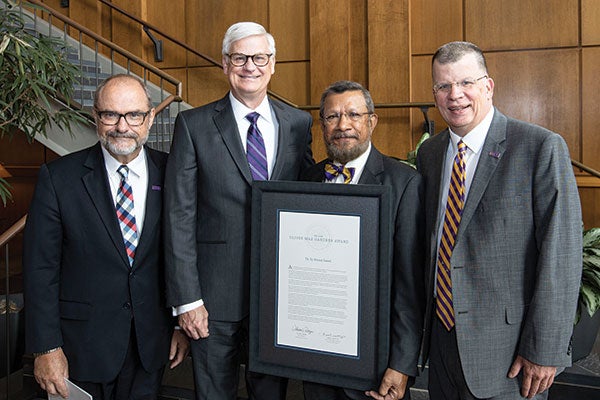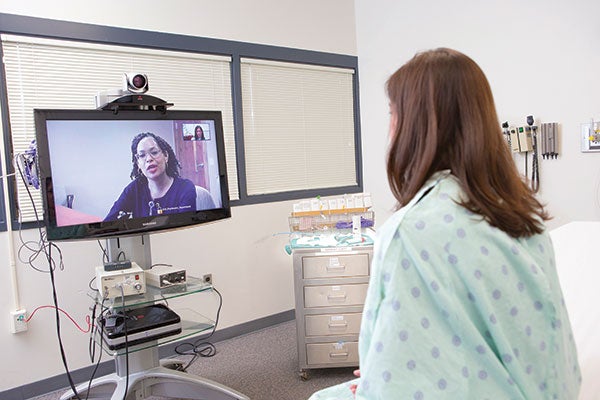Telepsychiatry
ECU-led network has served thousands
Not long ago, ECU psychiatrist Dr. Sy Saeed received a handwritten note from a woman halfway across the country who had read an article about him in her local newspaper.
The Associated Press article reported how telepsychiatry — the use of secure, real-time interactive audio and video technology at the bedside to connect patients with expert psychiatric assessments and mental health care — is helping combat the shortage and maldistribution of psychiatrists.
The article struck a chord with the woman, who wrote that her daughter had faced mental health challenges, and Saeed’s work is a step in the right direction for patients.
Fittingly, Saeed, professor and chair of the Department of Psychiatry and Behavioral Medicine at the Brody School of Medicine at ECU, has received the 2019 O. Max Gardner Award from the University of North Carolina System Board of Governors. The honor pays tribute to one faculty member within the system whose current work was deemed the greatest contribution to the welfare of the human race.
“He’s done things that people thought would be impossible,” says Dr. Mark Stacy, dean of Brody and vice chancellor for ECU’s Division of Health Sciences. “Telepsychiatry – people probably thought his idea was impossible, and now it’s in 60 hospitals in the state.”
An open door for the underserved

ECU Provost Ron Mitchelson, Vice Chancellor for Health Sciences Mark Stacy and Interim Chancellor Dan Gerlach (right) congratulate Dr. Sy Saeed on being named the 2019 recipient of the O. Max Gardner Award.
Saeed helped develop the N.C. Statewide Telepsychiatry Program and serves as director of that program and the ECU Center for Telepsychiatry and E-Behavioral Health. Much of his work focuses on using telepsychiatry to provide mental health care in remote and underserved areas where psychiatric services are scarce.
Established through state legislation in 2013 with $2 million in annual funding, NC-STeP is administered by the ECU CTeBH and is overseen by the Department of Health and Human Services’ Office of Rural Health.
More than 55% of North Carolina hospitals are set up for telepsychiatry. Specialists have completed more than 33,000 psychiatry assessments since the program’s inception, resulting in more than 4,300 involuntary commitments overturned. This has saved the state more than $23 million by preventing unnecessary hospitalizations and delivered care to patients previously untreated. It’s estimated at least 32% of telepsychiatry patients in the state would not have received treatment without the program.
“Telepsychiatry fills gaps with what science has promised these patients,” Saeed says. “They now have emergency intervention and access to professional medical care. We’ve opened a door.”
Bridging the mental health care gap
Telepsychiatry means when a patient requiring a telepsychiatry consult presents at a remote referring site, experts can assess the patient and consult with the referring physician, who is ultimately responsible for care decisions.
It’s the type of solution Saeed learned to seek early on.
In his native Pakistan, Saeed completed his medical training and was offered a position as chief medical officer at a federal medical center in a remote province. He traveled to the site, eager to connect with patients and offer solutions for health and wellness. Instead, Saeed found the center did not yet exist.
“I thought, ‘I’m here to serve people,’” Saeed says. “I convinced my boss to give me a temporary place (until the center was built) where I could start a clinic where people who needed care could go. That’s what led to my administrative leadership type of thinking on how you even start these things. The need was so dire.”
Since joining ECU in 2004, Saeed has pushed for change that could improve millions of lives. The statistics are still glaring: About a third of N.C. counties have no practicing psychiatrist; most are in the East. Saeed knew his work at ECU would be two-fold: to provide the state’s residents the services that were in essence promised to them as North Carolinians, and to help people in communities who were falling victim to the mental health care gap.
“It’s no longer just a gap,” Saeed says. “It’s a chasm.”
‘Quality care close to home’
Telepsychiatry allows patients to be heard and receive access to expert treatment where they are. For many, the only place to turn is their
hospital emergency department, where they often wait days for the appropriate evaluations.

Telepsychiatry enables patients in rural emergency departments to consult with a psychiatrist via a secure video connection.
“Dr. Saeed’s initiative addresses the need to provide timely acute care services to emergency departments throughout the state,” says Dr. Marvin Swartz, professor and head of the Division of Social and Community Psychiatry in the Duke University School of Medicine. “The emergency departments are struggling mightily to address the rising number of patients requiring behavioral health evaluations.”
Local health departments are jumping on board, too. Battle Betts Jr. is health director at Albemarle Regional Health Services in Elizabeth City, the first local health department to pilot the NC-STeP program.
“Based on the success of the initial NC-STeP program, it was a natural progression to expand the program into local health departments,” Betts says. “Since 2016 when we first ventured into this arena, over 80 different area providers have referred their patients to us for care. Behavioral health needs continue to rise in today’s society, and Dr. Saeed’s innovative vision has made great progress toward seeing that all residents of our state have access to quality care close to home.”
Saeed continues to pursue more improvements in mental health care treatment as research and evidence-based care evolve. He believes professionals have a duty to be pioneers.
“We have an obligation to stand on the shoulders of those who came before us and leave things better than how we found them,” he says. “We have a responsibility to be good stewards of resources and good stewards of knowledge.”
